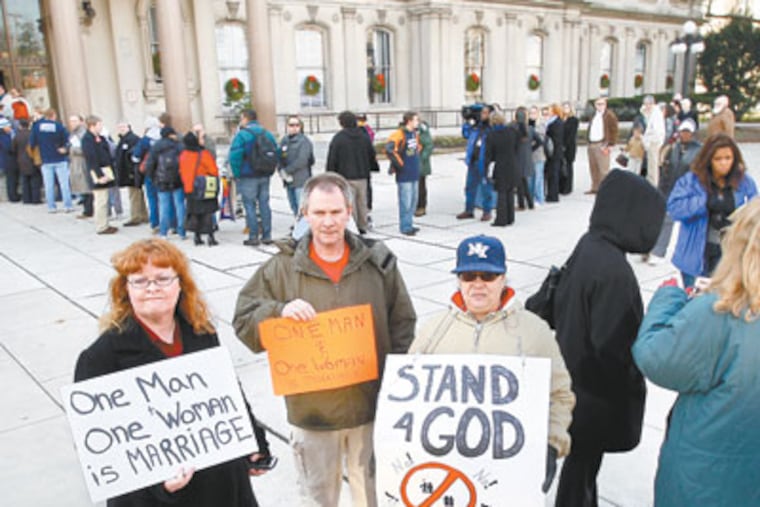N.J. Senate committee votes to allow gay marriage
The committee vote was 7-6 after hours of emotional debate. The full Senate could vote on the legislation Thursday.

A bill to allow same-sex marriages in New Jersey appears headed to the state Senate for a vote Thursday after being released by a committee late yesterday.
The Senate Judiciary Committee approved the legislation by a vote of 7-6 after nearly eight hours of debate and testimony that was at times emotional and eloquent.
The approved bill included an amendment intended to clarify that religious organizations would never be forced to sanction or participate in a marriage they disagreed with.
Advocates for same-sex marriage hope New Jersey will change the recent nationwide momentum on the issue. Last week, the New York state Senate rejected a same-sex marriage bill; last month, Maine voters overturned a law to allow such marriages.
Connecticut, Iowa, Massachusetts, Vermont and New Hampshire have approved same-sex marriage laws.
Activists on both sides of the issue packed a Trenton committee room, forming a line that extended out the door. More than 150 people signed up to testify.
Among those who spoke were the chairman of the board of the National Association for the Advancement of Colored People; a state lawmaker from Vermont; members of clergy both for and against the bill; a gay high school sophomore who said he felt like a second-class citizen in New Jersey; and gays and lesbians who testified that the state's civil-unions law has failed to offer them the same protections as marriage.
It's unclear if the bill has the 21 votes it needs to pass in the Senate on Thursday, but Senate President Richard Codey has said he would post the bill for a vote if it cleared the Judiciary Committee.
The legislation has not yet been scheduled for votes in the Assembly.
"What we're voting on today is the right of every citizen . . . to live with the person you love in full peace and security," said Sen. Loretta Weinberg (D., Bergen), a sponsor of the bill. "In this country we do not afford some people full civil rights and other people half civil rights."
Sen. Raymond Lesniak (D., Union), another sponsor of the bill, said allowing same-sex marriages would ensure that gays and lesbians can visit loved ones in hospitals, make arrangements for funerals, and allow them to get health and pension benefits without having to hire a lawyer.
"Those who oppose gay marriage are not unloving, hateful or cruel," Lesniak said. "But our law, which does not allow for gay marriage, provides a safe haven for those who are. Legalizing gay marriage will take away that safe haven and make us a more compassionate, understanding and loving society."
Opponents of the bill argued that New Jerseyans should be allowed to vote on whether to allow same-sex marriages and that the existing civil-unions law, which is supposed to allow gay couples in civil unions the same rights as married couples, should be better enforced.
Gay-rights advocates are pushing for the bill to be signed into law while Gov. Corzine, who supports it, remains in office. Gov.-elect Christopher J. Christie, who takes office Jan. 19, has said he would veto the bill.
Corzine issued a statement following the committee vote yesterday saying he was confident that "the marriage-equality issue will be recognized for what it truly is – a civil rights issue that must be approved to assure that every citizen is treated equally under the law."
Sen. Gerald Cardinale (R., Bergen) questioned the timing of the legislation, noting that a bill to allow voters to decide whether to allow same-sex marriages has been floating around the Legislature for six years and has never had a hearing.
"In every state where this issue has been put for a public vote, it has failed," said Cardinale. "Only a few elitists and I would say left-wing judges and a few I would say left-wing legislatures have passed it."
Cardinale also said he was concerned about the impact of same-sex marriages on children and that he believed they encourage some people down a path that is not beneficial to society.
But Sen. Nia Gill (D., Essex), compared some of Cardinale's arguments to the laws that allowed "separate but equal" facilities and services for African Americans.
Julian Bond, a civil-rights icon and chairman of the board of the NAACP, said he believes gay rights are civil rights.
"It does not matter the rationale, no people of good will should oppose marriage equality and they should not think that civil unions are a substitute," Bond said.
Among those who offered personal stories in their testimony was Gina Pastino, who lives with her partner of more than 15 years in Montclair.
Pastino told the committee about an incident during which her partner had to persuade an emergency room physician that she was entitled to be told about Pastino's medical care, just as a spouse would be informed.
The doctor eventually gave in, but in those few minutes, Pastino said, her partner was overcome with fear, panic, and shame that she might not be able to help.
"Everyone knows what it means to be married – if you say to somebody I'm married they instantly know," Pastino said. "They do not know what civil unions mean. Language matters."
Patrick Brannigan, executive director of the New Jersey Catholic Conference, said that the Catholic Church views the term same-sex marriage as a contradiction of terms.
"Rather than attempting to redefine marriage, the state of New Jersey should educate the public and should enforce state laws that provide protection for same-sex partners," Brannigan said.
He said the state has failed to educate the public and the institutions about the civil-unions law and failed to enforce it.
"Marriage is distinct in essence from every other arrangement because marriage is always between a man and a woman," Brannigan said.